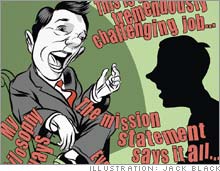|
How to avoid making bad hires
A surprising number of managers talk so much during interviews, that they end up hiring people who aren't right for the job.
(Business 2.0 Magazine) - For job candidates, it can come as a welcome relief -- or an unbearable annoyance. Call it the gasbag syndrome: the all-too-human tendency of interviewers to prattle on about themselves and their companies rather than give airtime to the person who wants the job. An interviewer's most common mistake
The costly consequences often go unnoticed: An unqualified candidate marvels at how mere nodding yielded an offer, or a hot prospect is passed over, simply for failing to penetrate the wall of blather. "It's the most common mistake made by interviewers," says David Ibarra, director of talent acquisition for $20 billion health insurer WellPoint (Research). "You leave an interview not knowing who the candidate really is."
If you've run off at the mouth while running interviews, don't be too hard on yourself. After all, some of the most experienced hirers can't resist showboating. On the first day of confirmation hearings for Samuel Alito's Supreme Court nomination, 13 of 15 senators spoke longer than the judge himself. Still, HR experts say even the gabbiest managers can learn to sidestep the traps that can destroy a good question-and-answer session. Here are the most common: Becoming a pushover. Like anyone else, managers want to be part of the conversation. But the more they talk, the more they unconsciously undermine an interview's very purpose. According to experts, chatty interviewers tend to vividly recall the warm sensation of having someone listen to them and are often fuzzy on details about the candidate's qualifications. In fact, when the interview is over, they're more likely to favor a compliant listener over a lively conversationalist. Gary Frost, vice chancellor at National University in La Jolla, Calif., has seen it happen many times in the thousands of interviews he's observed. "The interviewers who speak the most, and about themselves, always rate the candidate highly," Frost says. "They're left with this wonderful feeling of the recollection of their own stories." Falling for first impressions. Often what gets an interviewer talking--and steering the interview off course--is a positive first impression. "Sometimes you quickly get the idea that this is the right person," says Gerald Alcantar, vice president for diversity development at Fox Entertainment Group, who has conducted more than 1,000 interviews. "Then you ask the sorts of questions that elicit the answers you want, to reinforce that first impression." Taking the bait. Job candidates will often toss a well-placed compliment or two your way to break the ice, curry favor, or distract you from a line of tough questioning. Don't let your ego fall for it. If you do, you may be tempted to ramble--about your alma mater, say, or your illustrious career--while eliciting nothing from the interviewee. The same goes for answering too many questions from the interviewee about the company, benefits, or job description. Well-prepared candidates will already have done some homework. How To Shut Down Your Motormouth
A few remedies for long-winded interviewers: 1. Query the candidate about specific situations in his or her past to keep the focus off yourself. 2. Consider asking several questions at the start of the interview, then letting the candidate handle them, uninterrupted, in succession. 3. Invite a colleague to sit in on an interview; you'll be less likely to drone on about yourself. ________________________________________________
Click here to send a letter to the editor about this story. |
|

